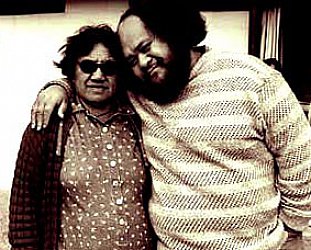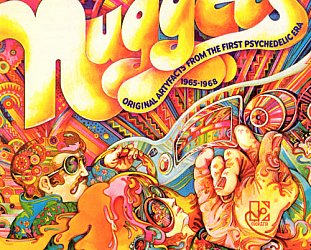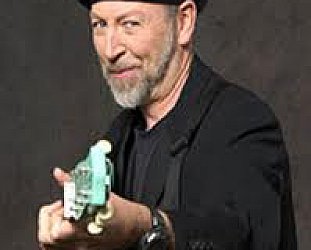Graham Reid | | 3 min read
Maaka McGregor has had a good day. In
Auckland for a week from his home in Titahi Bay and talking up the
Wai 100% album he has recorded with his partner Wai (aka Mina) Ripia,
he's just come from Mai FM.
His pitch met with a positive, if
unpublishably enthusiastic, response from programme director Manu
Taylor. A good day.
McGregor is under no illusions how
difficult it will be to get tracks off Wai 100% playlisted. The album
is all in the Maori language (te reo) and even Mai FM - whose local content and te reo
commitment have sometimes been questioned - was never going to simply
fall into line.
But with a little editing, says Taylor,
the track Te Tokomauri Manawa will certainly get airplay. It's
possible Mai FM - or indeed any contemporary music station - would
find something on this album of te reo, block rockin' beats, hip-hop
textures, wairua-soul and chant-based melodies.
McGregor and Ripia have carved an album
long on tradition and diversity. There's even an aerobics track which
McGregor says they have sampled and extended to a half-hour version.
"There are a lot of marae aerobic
programmes now so we've got some music using poi rhythms, at 156 bpm,
and with Maori lyrics."
What pulls Wai 100% into a cohesive
whole despite its market-friendly diversity, are te reo and the use
of amplified poi beats, a technique pioneered by Dalvanius on the Poi
E album and occasionally explored by Moana and the Moa Hunters.
"For us, that's where our sounds
come from, what makes us unique is our language and our sounds,"
says McGregor.
"Many of the [songs] we as Maori
produce are monotonal and away from western song structure. But if we
include sounds of poi and breaths and [foot] stamps in a more
contemporary form, the ears out there will start going,'That sounds
good.'
And Wai 100% certainly sounds good as
it brings the collective experience of McGregor and Ripia together.
McGregor was a member of the seminal Wellington reggae-rock band
Aotearoa while at school ("We got permission to go on tour
before School Cert, it was like, 'This is our career!"') and has
played with Moana and the Moa Hunters, Dam Native, Upper Hutt Posse,
Marie Sheehan, and is currently in Southside of Bombay.
He started as a guitarist and moved to
drums and percussion, and for Wai 100% he has played all the
instruments (additional keyboards by Iain Gordon) and had it mastered
in Sydney's 301 Studio.
He has been with Ripia since meeting
her on the road in 1988 when she was with Moana and Moa Hunters. "Her
dad passed away two years ago and she went through a lot of emotions.
She wrote the songs for Wai 100% from out of that."
Despite its unhappy origins, Wai 100%
has a celebratory feel - and McGregor says the response since its
launch in Wellington a month ago has been enthusiastic, especially
from those overseas who've heard it.
And as much as the album is up to the
moment in contemporary production and sound, so too is McGregor and
Ripia's company Minaaka Ltd which boasts an elaborate website with
links to French sites.
By chance the pair met Frenchman Jo Le
Guen, who attempted to row from Wellington to Chile earlier this
year. They hit it off, and the filmmaker who was shooting footage of
Le Guen for a documentary asked to use some of their music for the
soundtrack.
The filmmakers' website builder offered
to construct one for them, and now McGregor says they are looking to
creating a new one in French, encouraged by news that their aerobic
track is getting play in Paris clubs.
McGregor says they are looking at
distribution of the album in France and working up a live show
involving DJs, poi players and singers.
And McGregor has a clear answer for
those who would say their album might be more accessible if it had
some lyrics in English.
"Our language is dying and the
buck stops with me and with you and with everyone in this country in
order for our language to survive. This is our way of contributing to
the survival of the language in a contemporary form.
"If we didn't perform in Maori, in
30 years there'd be an even bigger lack of Maori and Maori music out
there.
"We should all have been brought
up speaking Maori so it's natural progression for us to speak two
languages."







post a comment